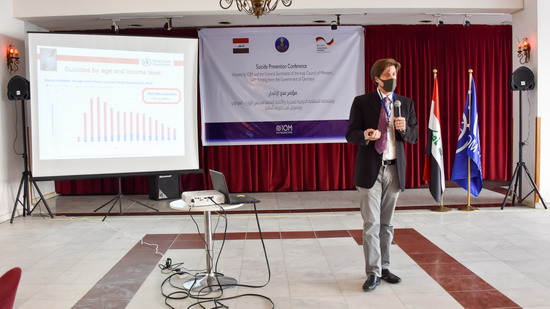 Baghdad Iraq, 9 December 2020 – The growing number of suicide cases in Iraq over the past years is a worrying public health concern that can no longer be ignored. If not addressed, it will keep taking a heavy toll on individuals and communities in the country.
Baghdad Iraq, 9 December 2020 – The growing number of suicide cases in Iraq over the past years is a worrying public health concern that can no longer be ignored. If not addressed, it will keep taking a heavy toll on individuals and communities in the country.
Over 590 people died in 2019 in Iraq due to suicide, and 1112 attempted suicide; 80% of these people were women which translates to an average of one death per day due to suicide, and 3 people per day to have attempted suicide. The number of suicide cases reported in 2019 is higher than those reported in 2018 (519) and 2017 (422). Suicide is preventable. Understanding the causes of suicide and identifying who is at risk can help reduce the mortality.
WHO acknowledges suicide as a public health priority. Globally, 800 000 people die yearly due to suicide, and for every case, more than 20 others most likely attempt suicide. There is also one death recorded every 40 seconds globally due to suicide. WHO works with governments to increase awareness of the public health significance of suicide and suicide attempts.
Suicide is one of the priority health conditions in the WHO Mental Health Gap Action Programme (mhGAP); this provides evidence-based technical guidance to scale up service provision and care in countries for mental, neurological, and substance use disorders. Everyone has a stake in helping communities to address suicide risk factors, including managing mental health conditions,“ said Dr Adham Ismailm, WHO Representative, Iraq.
“WHO is working with partners globally to make suicide prevention a high priority on the global public health agenda. In Iraq, we aim to encourage and support countries to develop or strengthen comprehensive suicide prevention strategies in a multisectoral public health approach and to strengthen mental health interventions that constitute a bigger trigger for suicides, added Dr Adham.
Over several years, many Iraqi families have suffered with mental health scars caused by past conflicts and economic hostilities, as if this is not enough; many communities have also faced new stay-at-home restrictions or limited movements to curb the spread of COVID-19. This, public health experts say, raises concerns as it may increase suicide rates or associated risk factors, including social isolation, anxiety, fear of contagion, uncertainty, unemployment, chronic stress, and economic difficulties, which could worsen depression, anxiety, and substance abuse. Other factors include barriers to access mental health services, depression, and insomnia among populations and some health care professionals.
Also, various factors could contribute to rates of suicide in Iraq, including intimate partner problems, physical health conditions, financial challenges, and legal issues. Others are personal or family experiences of violence, for instance, child abuse, neglect, or family history of suicide and broader community conditions, such as high crime rates and violence.
According to Dr Emad Abdulrazaq, the National Adviser for Mental Health at the Ministry of Health Iraq, a key component in suicide prevention in Iraq, is improving the accessibility of health services. “Through a multisectoral action, it is fundamental to build capacity, ensure quality of care of health services, increase awareness and advocacy on mental health and tackling stigma. A special focus needs to be put on high-risk groups through early detection and appropriate management,” said Dr Abdulrazaq.
To reduce suicides in the country during and after the COVID-19 crisis and beyond, WHO recommends that all partners supporting mental health interventions work with communities to provide adequate mental health services in the communities and decrease stress, anxiety, fears, and loneliness in the general population. WHO also recommends responsible media campaigns using traditional and social media to promote mental health and reduce distress need to be strengthened and conduct outreach, especially for people with a history of psychiatric disorders, COVID-19 survivors, and older adults.
For more information or to request media interviews, please contact:
Pauline Ajello, Communications Officer, +964 7729 877 288,
Bruni, Andrea, Mental Health Officer, +964 7822111737,
Ajyal Sultani, Communications Officer, +964 7740 892 878,


